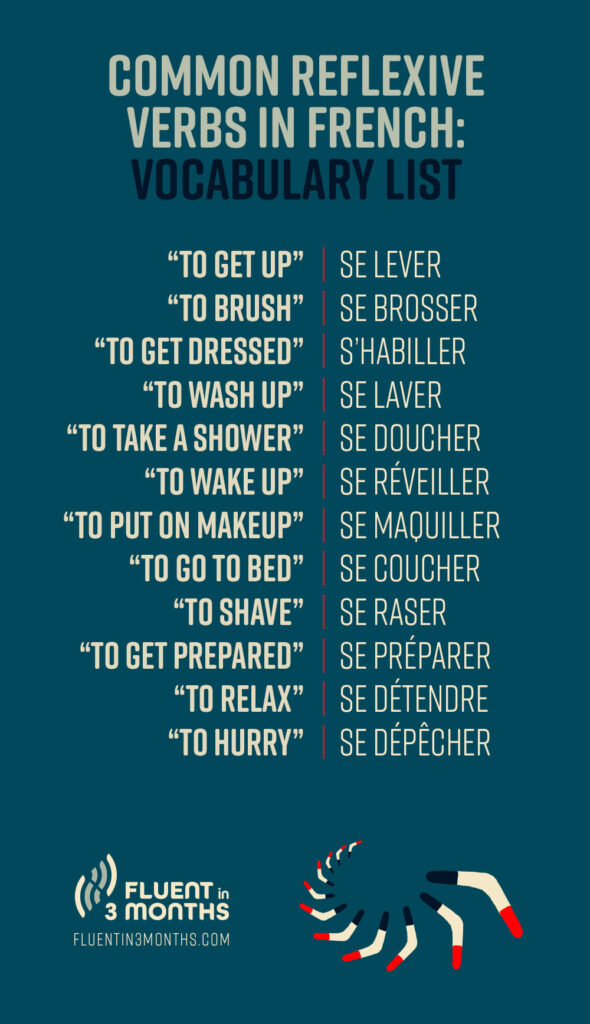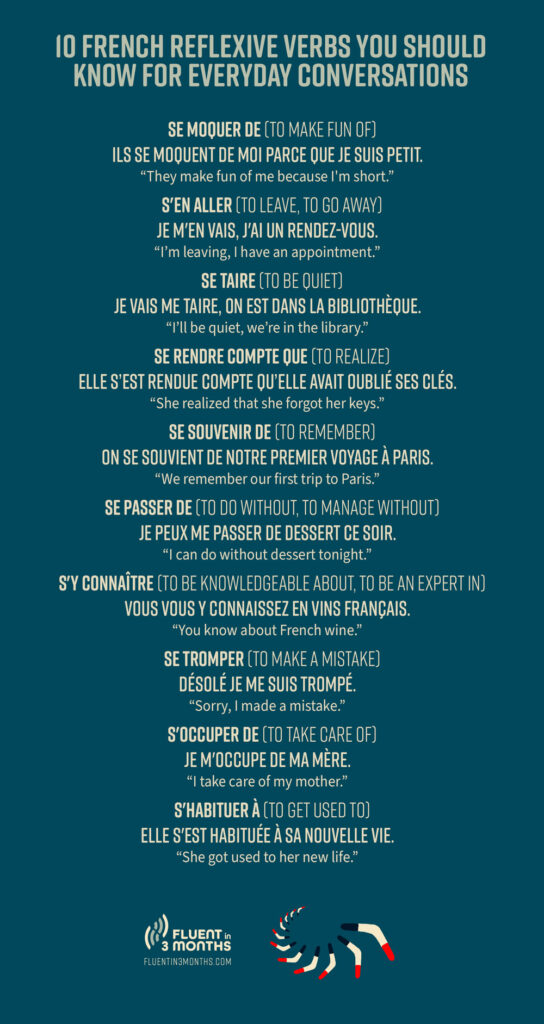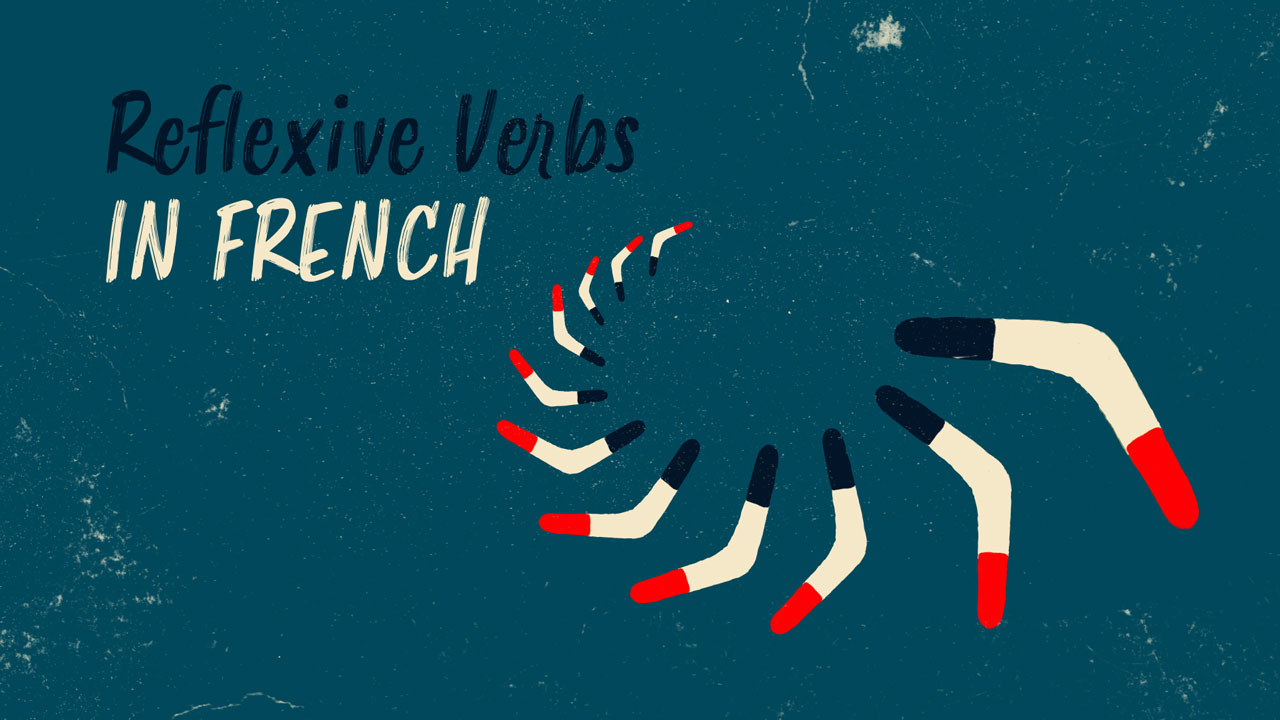French Reflexive Verbs [With Conjugations, Vocab Lists, & Audio]
Think of French reflexive verbs as they are related to the word “reflect.” They describe actions that you do to yourself (in technical terms, that reflect back on the subject). These are things like getting dressed, brushing your hair, or introducing yourself.
For example, je me brosse les cheveux means “I brush my hair.” The reflexive verb here is se brosser, conjugated for je. If I say je brosse les cheveux, it means “I brush the hair” — not my own hair. So this phrase doesn’t sound quite right.
Not all French verbs are reflexive verbs, but a handful of them are.
Both beginners and advanced learners need to be familiar as they often come up in everyday speech and writing. Imagine — even saying your name in French is with a reflexive verb. Je m’appelle Yaren is how I’d say “my name is Yaren” but its literal translation is “I call myself Yaren!”
French Reflexive Verbs: Vocabulary List
Let’s start with a vocabulary list, covering the most common French reflexive verbs that will come up later in the article:
| English | French | Audio |
|---|---|---|
| “to get up” | se lever | |
| “to brush” | se brosser | |
| “to get dressed” | s’habiller | |
| “to wash up” | se laver | |
| “to take a shower” | se doucher | |
| “to wake up” | se réveiller | |
| “to put on makeup” | se maquiller | |
| “to go to bed” | se coucher | |
| “to shave” | se raser | |
| “to get prepared” | se préparer | |
| “to relax” | se détendre | |
| “to hurry” | se dépêcher |

What are Reflexive Verbs and How Do You Use Them?
Reflexive verbs are the verbs that reflect the action back on the subject, with the help of reflexive pronouns.
For example, lever means “to lift.” With a reflexive pronoun, se lever will have a different meaning, “to get up.” Similarly, laver means “to wash something.” Se laver is “to wash oneself.”
The reflexive verbs have two parts: the verb itself and a reflexive pronoun, one of the types of French pronouns. To decide which reflexive pronoun to use, we should look at the subject who’s performing the action. For example, if I’m the one who’s getting up, I’d say je me lève. If I’m talking about someone who’s getting up, I’d say il se lève or elle se lève.
The infinitive form of the verb to get up is “se lever.” To conjugate, we need to choose the right pronoun for each subject. Here are the reflexive pronouns in French:
- me/m’ (“me, myself”)
- te/t’ (“you, yourself,” singular informal)
- se/s’ (“he, himself; her, herself; it, itself; one, oneself; us, ourselves” – when used with on instead of nous)
- nous (“us, ourselves”)
- vous (“you, yourself,” plural/singular formal)
- se/s’ (“them, themselves”)
When followed by a vowel, me, te, and se become m’ t’ and s’. Think of je m’appelle, tu t’appelles, or elle s’appelle. While a lot of words have a reflexive and non-reflexive form, such as lever (“to lift”) and se lever (“to get up”), some verbs are only used in their reflexive forms. For example, se moquer means “to make fun of someone.” It’s not really common to say moquer. We’ll get to this later!
Example Sentences with Everyday Reflexive Verbs
We’ve already covered se lever (“to get up”), s’appeler (“to be called”), and se laver (“to wash”), all part of daily French vocabulary. Here are some example sentences with common reflexive verbs:
| Verb | English Sentence | French Sentence | Audio |
|---|---|---|---|
| Se lever (“to get up”) | “I wake up early to go to work.” | Je me lève tôt pour aller au travail. | |
| Se brosser les dents (“to brush your teeth”) | “He brushes his teeth twice a day.” | Il se brosse les dents deux fois par jour. | |
| S’habiller (“to get dressed”) | “You always dress well.” | Tu t'habilles toujours bien. | |
| Se laver les mains (“to wash one’s hands”) | “I wash my hands before eating.” | Je me lave les mains avant de manger. | |
| Se coucher (“to go to bed”) | “We usually go to bed around 10 pm.” (In French, nous and on both mean “we.” On is more common in daily life. | Nous nous couchons généralement vers 22 heures / On se couche généralement vers 22 heures. | |
| Se réveiller (“to wake up”) | “She often wakes up during the night.” | Elle se réveille souvent pendant la nuit. | |
| Se maquiller (“to put on makeup”) | “They always put on makeup before going out.” | Elles se maquillent toujours avant de sortir. | |
| Se doucher (“to take a shower”) | “You take a shower after the gym.” | Tu te douches après la gym. | |
| Se préparer (“to get prepared”) | “They get ready an hour in advance.” | Ils se préparent une heure à l'avance. | |
| Se détendre (“to relax”) | “I relax by reading a good book.” | Je me détends en lisant un bon livre. | |
| Se dépêcher (“to hurry”) | “Can you hurry, please?” | Tu te dépêches, s'il te plaît? |
These are just a few examples of the many reflexive verbs used in everyday French. As you can see, they cover a wide range of common actions, from hygiene to daily routines, and from habits to personal preferences.
Reflexive Verbs in Different Tenses
Mastering French word order can take a while. And with reflexive verbs, you should also consider where the pronoun goes in the sentence. Let’s take a look at how reflexive verbs are conjugated in various tenses. If you haven’t covered the other tenses yet, feel free to just practice the present tense and come back to this article when you’re ready!
Present Tense: Choose the right reflexive pronoun and conjugate the verb as it would normally be conjugated.
- Tu te lèves. “You get up.”
- Il se brosse les dents. “He brushes his teeth.”
Past Tense – Passé Composé: With reflexive verbs, we should always use être in passé composé, no matter if the non-reflexive version of the verb uses avoir. The conjugated version of être comes between the pronoun and the verb, which must be in the past participle of the verb.
- Je me suis levé tôt. “I got up early.”
- On s’est habillés rapidement. “We got dressed quickly.”
- Vous vous êtes maquillées pour la soirée. “You put on makeup for the evening.”
Imperfect Tense: We conjugate the verb in the imperfect tense, imparfait. The pronoun stays as it is.
- Tu te couchais tard. “You used to go to bed late.”
- Ils s’habillaient bien. “They used to dress well.”
Future Tense: We conjugate the verb in the future tense, le futur simple. The pronoun stays as it is.
- Je me réveillerai à 7 heures demain. “I will wake up at 7 o’clock tomorrow.”
- Elle se maquillera avant la cérémonie. “She will put on makeup before the ceremony.”
Conditional Tense: We conjugate the verb in the future tense, le futur simple. The pronoun stays as it is.
- Je me lèverais plus tôt si j’avais des cours. “I would get up earlier if I had lessons.”
- Je m’habillerais différemment si je savais qu’on allait au sport. “I would dress differently if I knew we were going to do sports.”
Useful Expressions with Reflexive Verbs
French is not short of expressions and idioms — and sometimes, they include reflexive verbs. Let’s take a look at some common expressions with reflexive verbs. Besides the classic je me lève and je m’habille, these expressions will make your French vocabulary more elaborate.
| French Verb | Example Sentence (English) | Example Sentence (French) | Audio |
|---|---|---|---|
| Se moquer de (to make fun of) | “They make fun of me because I'm short.” | Ils se moquent de moi parce que je suis petit. | |
| S'en aller (to leave, to go away) | “I’m leaving, I have an appointment.” | Je m'en vais, j'ai un rendez-vous. | |
| Se taire (to be quiet) | “I’ll be quiet, we’re in the library.” | Je vais me taire, on est dans la bibliothèque. | |
| Se rendre compte que (to realize) | “She realized that she forgot her keys.” | Elle s’est rendue compte qu’elle avait oublié ses clés. | |
| Se souvenir de (to remember) | “We remember our first trip to Paris.” | On se souvient de notre premier voyage à Paris. | |
| Se passer de (to do without, to manage without) | “I can do without dessert tonight.” | Je peux me passer de dessert ce soir. | |
| S'y connaître (to be knowledgeable about, to be an expert in) | “You know about French wine.” | Vous vous y connaissez en vins français. | |
| Se tromper (to make a mistake) | “Sorry, I made a mistake.” | Désolé je me suis trompé. | |
| S'occuper de (to take care of) | “I take care of my mother.” | Je m'occupe de ma mère. | |
| S'habituer à (to get used to) | “She got used to her new life.” | Elle s'est habituée à sa nouvelle vie. |

Negative Reflexive Verbs
Quick recap: to make a sentence negative in French, we need the words ne and pas. Example: je ne marche pas, “I don’t walk.” With reflexive verbs, French negation follows a similar structure: ne + reflexive pronoun + verb + pas.
Here are some examples:
- Je ne me souviens pas de notre voyage à Paris. “I don’t remember our Paris trip.”
- Il ne se lève pas tôt. “He doesn’t wake up early.”
With passé composé, it’s slightly different. The structure is: ne + reflexive pronoun + être + pas + past participle. It may sound a bit complicated, but think of it as “there can only be one verb between ne and pas.” Here are some examples that will make it clearer:
- Je ne me suis pas réveillé tard. “I didn’t wake up late.”
- Tu ne t’es pas rasé ce matin. “You didn’t shave this morning.”
With Some Practice, You’ll Soon Master Reflexive Verbs
When studying reflexive verbs, look for common patterns. Many verbs follow similar patterns with the regular verbs — se laver is conjugated the same way as laver, a first-group regular verb, for example.
The more you watch French movies, listen to French songs, and immerse yourself in the language, the easier it will be to know when to use reflexive verbs and how to conjugate them. Practice makes perfect may be cliché advice, but in this context, it’s true!



Social